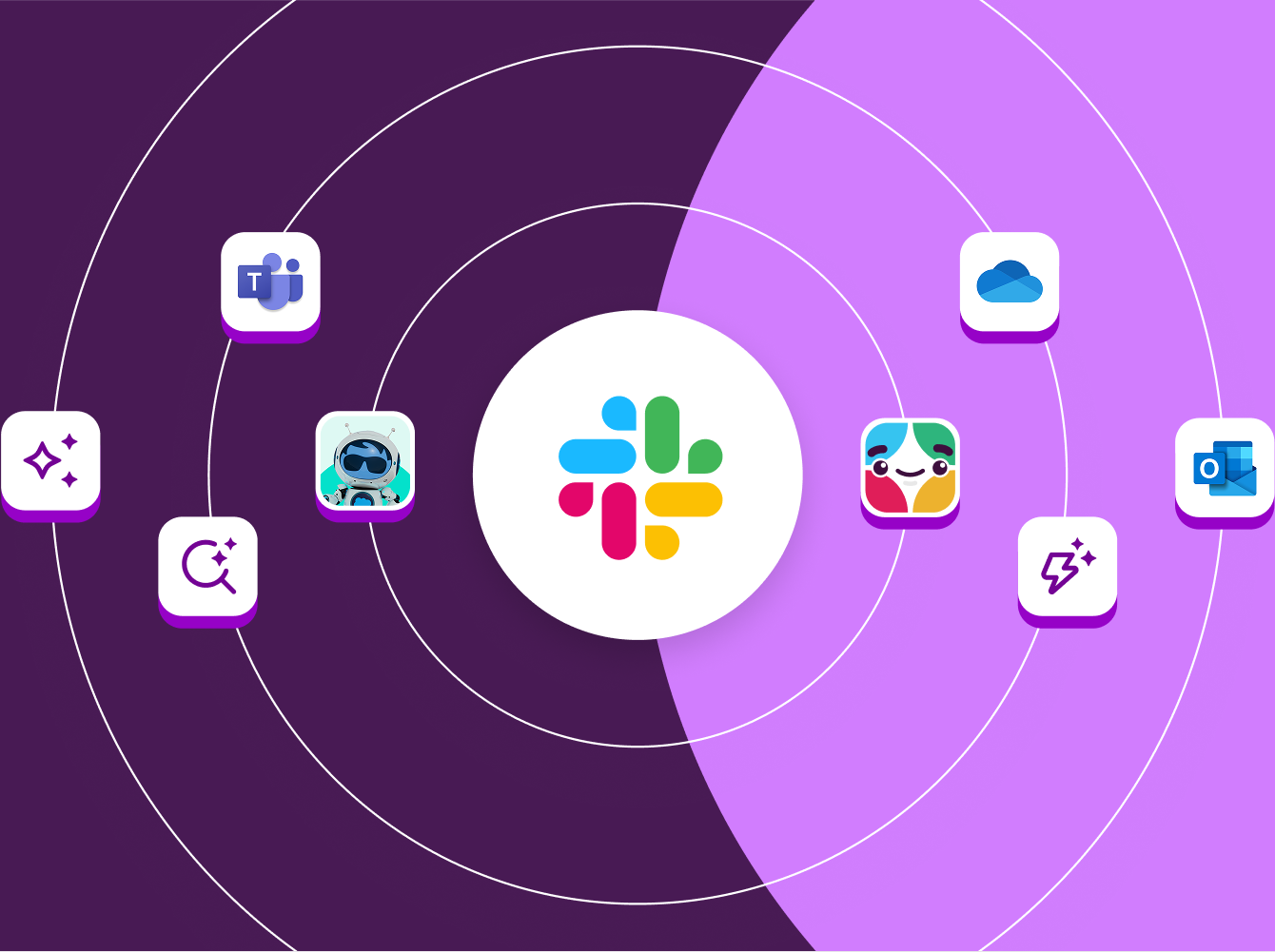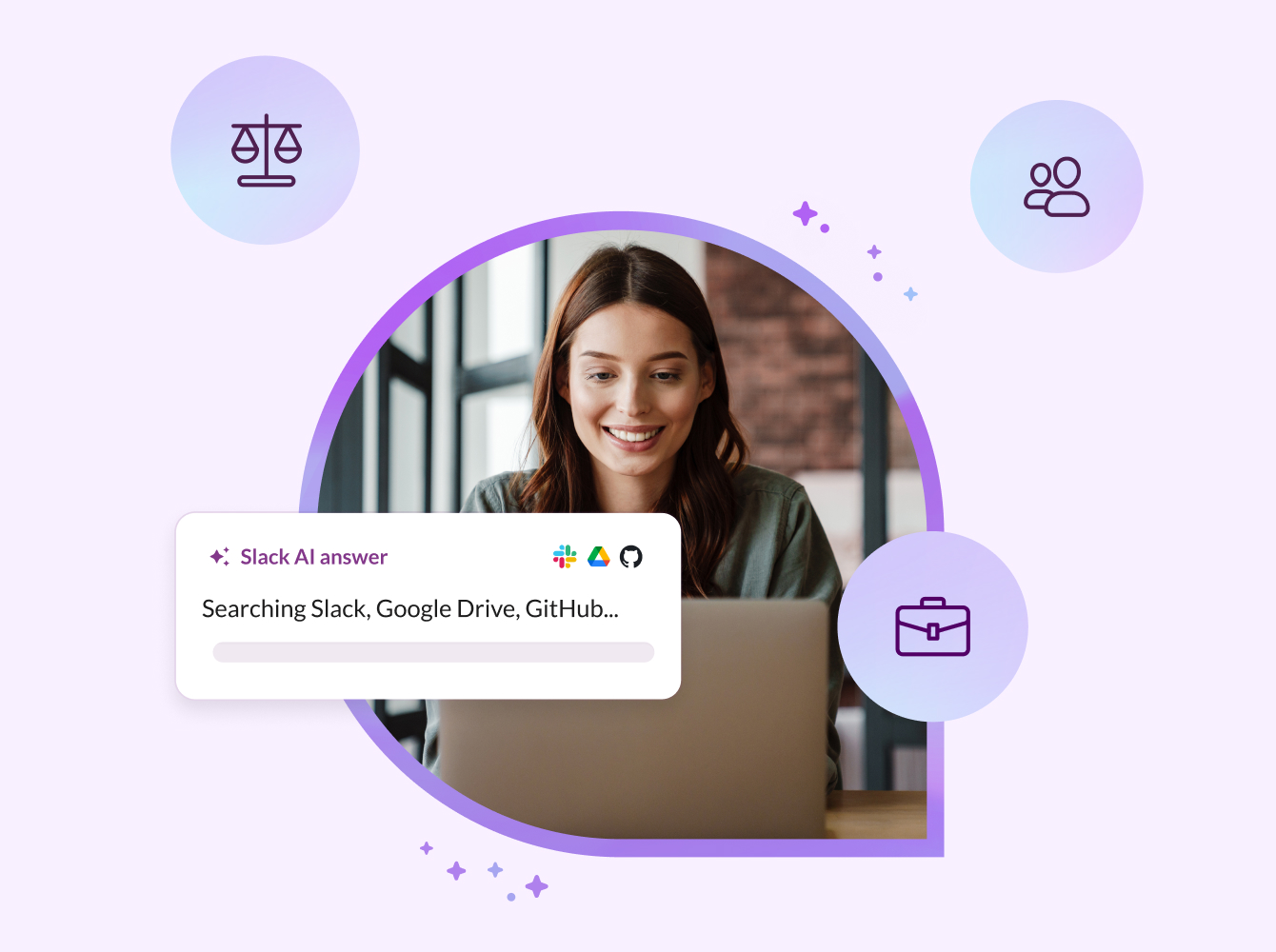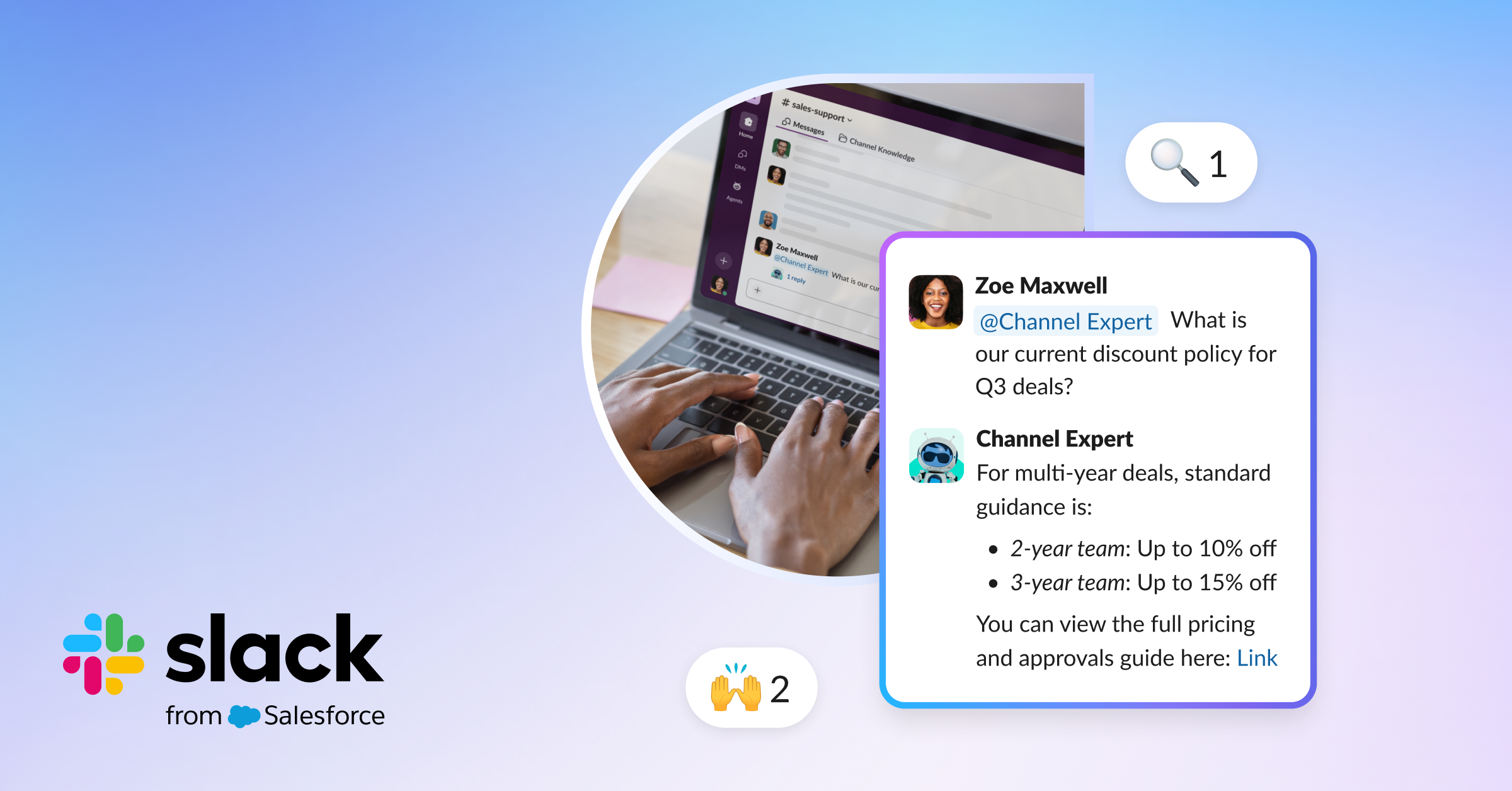Slack for internal comms
Slack for internal communications can help to increase employee trust and efficiency as it becomes the single source of information and way to have real-time responses. It also publicly stores posts and announcements, so they’re not lost in email inboxes or missed with distribution lists.
6%
increase in employee satisfaction*
32 minutes
saved per Slack user per day*
Before any announcement, start here:
Behind the scenes before any announcement, you’ll want to do planning and team coordination in private channels. Pre-planning, even without anticipating a scheduled message, helps to establish trust with teams by providing cohesive and clear messaging. This pre-planning helps to streamline organisation, especially in the event that a company-wide message needs to be sent urgently.
Pre-plan with the following points:
- Build a communications strategy and structure:
- Identify organisational leaders who create and distribute company-wide communications and announcements, such as Leadership, HR, People, Communications or Workplace Operations.
- From this, determine who should have posting permissions in each applicable channel.
- Build an announcement approval process; what is the timeline and who needs to approve the message?
- Create and pin Slack etiquette guidelines to all announcement channels. We recommend putting these guidelines in a canvas, so they can easily be updated.
- Create and proof messages:
- Define tone and message style for announcements. Draft messages and share for feedback and collaboration in private channels.
- Define whether a message is confidential.
- Determine whether reply threads should be turned on or off; this can vary by channel or post.
- Consider using written text, a prerecorded clip or a combination to engage your audience. Using Block Kit is a great way to create templated messages!
- Post the message in channel:
- Decide when is the best time to send the message in a channel; are your users most engaged in the morning or afternoon? Are there any time zone considerations? By using message activity monitoring, you’re able to determine when it’s best to post.
- Use scheduled send to reduce task load.
Company-wide announcements
Company-wide announcements are used to disseminate critical information to the whole organisation. This can include updates about benefits, leadership changes, acquisitions, or a new product or feature release.
Establish announcement consistency with a channel strategy, which can include the following:
- Post news based on global, location/office-based or team audiences
- Cadence of communication; should this be regular, proactive communication or based on new topics?
- Posting permissions for designated individuals ensure that announcements channels are used and trusted for informational posts, rather than cluttered with many posts and conversations from users.
- We recommend that most announcement channels are restricted to read-only permissions, so that replies are not permitted in threads.
- Rules of engagement
- Create a channel-naming convention such as #announcements-company-name, #announcements-global, #announcements-team or #announcements-location
A great example of using an announcement channel is to announce a new internal tool, such as an ethics hotline:

All-company meetings
You can support all-company meetings by providing pre-meeting, immediate and post-meeting information in one location.
Streamline this information by:
- Creating an #all-company-call channel
- Reminders and preview agendas of meetings
- Share recaps, decks, questions and answers, and recordings
- Monitor AV issues in real time
- Before the call, in your private channels for communication leaders, create a process to handle questions and concerns and set expectations accordingly. This can include moving the conversation out of Slack if it will be more productive.
- You can also create notifications to alert you when certain words are used in private and public channels, so that you can understand where the conversations are happening.
Field questions and feedback using Workflow Builder:
- Employees can pre-submit questions or ask them during the meeting
- Workflow Builder allows for anonymity and remote participation
- It also creates a repository of questions and answers so that you can address common themes or capture ideas
- Dedicated team member can ask questions live on behalf of employees

Recurring announcements
Company, organisation or location updates are sent on a regular cadence. These updates can include things such as training sessions, job openings or local office happenings.
- Updates can be sent monthly, bimonthly or weekly
- Post and moderating privileges are assigned to organisation or site leaders
- By posting in channel, you can compare engagement with message activity to learn what resonates with employees.
- Post in channels such as #announcements-global, #announcements-team or #announcements-officelocation
- Slack and Salesforce post daily in an announcements channel with a daily newsletter that announces new features, volunteer opportunities and learning courses. Canvas templates can be used to create newsletters

Executive communications
Prior to announcements, leadership will want to share the messaging with managers so that they’re able to readily support their teams.
- Create private channels with different levels of leadership
- Determine when and to whom the information will be cascaded prior to the general announcement
- Use clips to share messages that require nuance and expression
- EAs are able to post and reply on behalf of their executive using the On Behalf of Bot
Where’s the boss?
A popular channel with many Slack customers is a #where’s-the-boss or #tales-from-the-road, which allows leaders and employees to highlight where they’re travelling, for work or fun. These posts can include clips and updates about a customer visit or insight into how employees are spending their free time.
‘Ask me anything’ sessions
Employees and leadership can engage directly, regardless of location, through a scheduled AMA session in a dedicated public channel. Leadership is given a direct line to understand employee ideas and concerns, and employees are given a way to easily access skip-level conversations.
- Choose a different senior leader each time or have an always-on exec AMA channel
- Ask questions in real time or leave questions in channel for next time
- A designated channel such as #AMA-leadership makes it easy for people to see previous questions or catch up later
How do you manage AMA questions?
- Have a few sample questions queued up to start the conversation in case individuals are slow to start
- Create a strategy before the AMA on how to handle any challenging questions, such as asking the individual posing the questions to meet in real time later with their manager, or templated responses to questions that can’t be publicly answered
- Employees can ask questions anonymously (if given permission), which can often drive more engagement
- Develop responses to FAQ to maximise executive time
- Encourage and praise employees for engaging with the AMA

Recognition
Create public kudos channels to complement existing recognition programmes. You can also integrate a feedback tool in recognition channels and people can generate kudos using simple Slack commands.
- Opportunity to publicly thank teammates for great work
- Create a channel such as #customer-success-kudos
- Use a bot or workflow to make it easy
- Share company anniversaries and milestones, such as promotions or KPI achievements
- All levels, from leadership to entry level, are able to see accomplishments and congratulate employees
- Uncover trends and metrics on values usage – this can give you insights on when the best time is to post and how many people have viewed the post
- At Slack, we create custom emoji to celebrate employees who go above and beyond!

How to handle ‘spicy’ situations
Slack has a variety of tools to allow end users to report and admins to respond to inappropriate behaviour.
- Flag messages: Enterprise Grid customers can enable workspace members to flag messages for review by designated content admins
- Lock thread: Enterprise Grid customers can also take action to prevent additional replies and emoji reactions in thread
- Identify team members to take action: Team members with decision-making authority flag messages and lock threads. These team members can include local site leaders, EAs, internal comms, workplace operations and HR. (User needs to be given an admin role)
- Keyword notifications: Input keywords to be notified about when they are used in Slack, which allows you to passively monitor channels.
Conclusion
Slack can be used in a variety of ways, from direct messages to multi-person channel conversations to company-wide internal communications and announcements. Slack offers a variety of ways to increase the visibility of and engagement with your internal announcements, while streamlining your communication strategy. At Slack, we use the platform for announcements about company-wide or local updates, feature releases, AMAs (‘ask me anything’ sessions) with leadership and critical news impacting employees.
*‘The Total Economic Impact of Slack for Sales Teams’, a commissioned study conducted by Forrester Consulting on behalf of Slack, April 2021










